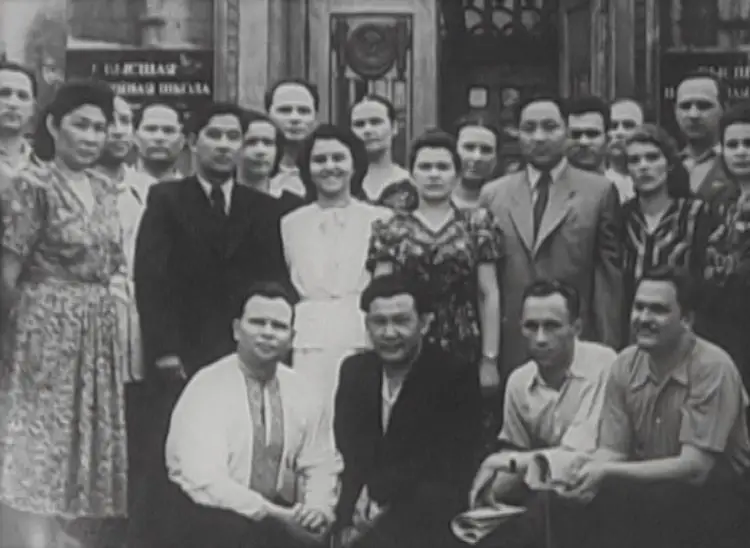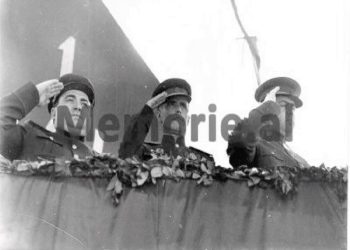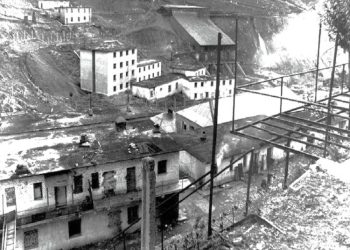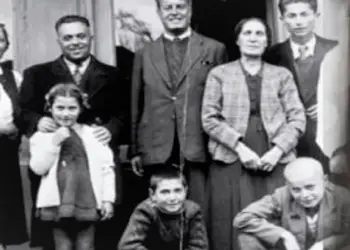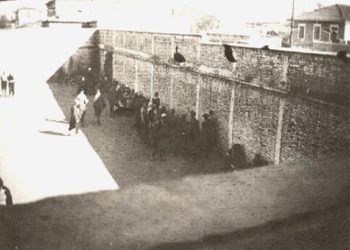Dashnor Kaloçi
Memorie.al publishes some archival documents issued by the Central State Archive in Tirana (fund of the former Central Committee of the ALP), which belong to October 1960, where the minutes of the meeting of the Politburo are located of the Central Committee of the ALP, where the work and activity of the Minister of Agriculture, Maqo Çomo, the husband of Liri Belishova, a member of the Politburo and the secretary of the Central Committee of the ALP, covering propaganda and art and culture. The full speech of the Secretary General of the ALP, Enver Hoxha, regarding Liri Belishova, who had just been condemned by the Party, as well as the “flaws and weaknesses” in the work of her husband, Maqo Çomo, in the position of Minister of Agriculture , for which Enver, among other things, said: “I have always agreed with the criticism made by Maqo Çomo’s friends and we have noticed that he has not corrected the flaws and mistakes at work and therefore the Ministry of Agriculture continues not to go good. We think and propose to take measures to radically improve the work in agriculture. First of all, to dismiss Maqo Çomon as a minister and replace him with another friend, in order to give an even bigger impetus to agriculture. “We do not blame him for all the weaknesses we have in agriculture.”
Discussion of Enver Hoxha at the meeting of the Politburo, October 1960
Discussion at the meeting of the Politburo of the Central Committee of the ALP on the shortcomings at work and the wrong attitudes of Maqo Çomo
October 31, 1960
Before Maqo Çomoja spoke, I wanted to emphasize that he should have no doubt that he is proposed to be removed from office as a minister, because he is the husband of Liri Belishova. Liria was convicted because he capitulated and severely violated the political and ideological line of the Party, and he is not thought to be fired as Minister of Agriculture, automatically because he is her husband. If we had reached such a conclusion, there is no doubt that we would have noted it in the report that was distributed to the friends of the Bureau. Maqo Çomo’s position regarding the guilt and sentencing of Liri Belishova, we cannot say that he was right and in that spirit as the entire Central Committee said unanimously.
His discussion on these issues differed greatly from the discussions and opinions of all the other comrades who spoke. His main fault is that he did not work well in the Ministry of Agriculture. The point is that during his time as a minister, he has been constantly criticized, he has even been called to the Politburo and the Secretariat, where he has been criticized, pointing out his mistakes and shortcomings, in order to improve them those. I can say that friends with responsibilities in the Politburo and in the Government, long ago, for years, came to me and submitted and asked me many times for his case to be reviewed in the Politburo, because he there are many flaws and mistakes, so the work in the Ministry of Agriculture is not going well.
But my opinion and that of other friends of the Bureau has been to criticize and help him. I have always agreed with the criticisms made by Maqo Çomo towards my friends and we have noticed that he has not corrected the flaws and mistakes at work and therefore the Ministry of Agriculture continues to do poorly. We think and propose to take measures to radically improve the work in agriculture. First of all, to dismiss Maqo Çomon as a minister and replace him with another friend, in order to give an even bigger impetus to agriculture. We do not blame him for the weaknesses we have in agriculture. We attribute to him what belongs to him, because we know that agriculture also depends on many other factors. But his dismissal to be a great lesson for him and for anyone else who does not perform the task well. After Maqo (Çomoja) spoke, and after discussions with the members of the Politburo, he took the floor again.
COMRADE ENVER HOXHA: I agree with everything that the friends of the Politburo said. The experience of our Party has taught us to see many things in life. One of the lessons we have learned from life is that despite the fair help and criticism that has been given to some people by the Party, there have been some of them that have not been corrected, but on the contrary have gone further, until they have reached positions antiparty. Such a danger exists especially for those who are arrogant, who have great faith in their minds and in their views, so much so that sometimes they put these above the right views of the Party. Pride brings many dangers. Friends told him honestly, that in him there is in strong doses arrogance.
This criticism has been made to him other times, but apparently he does not want to understand, reflect and improve. We will help him walk the path of the Party, but it depends on him. With his arrogance, there is a danger that he will not maintain a fair attitude towards the Party, its line of leadership, for which Liri Belishova was also convicted. If you did not have contact with Freedom and did not coexist with it, I did not intend to say this, however, tell her not to go any further! Both be careful not to go any further! Liri Belishova has expressed opposite views to the line of the Central Committee, but we find that she has not yet understood her mistakes, which are very serious. Freedom must understand that it is not in the way of the Party. We are fully convinced that she has been on the wrong path, while the Central Committee of the Party is on the right path.
As the days go by, more and more big facts are accumulated, which prove that the Soviet leadership is on the wrong path. Let freedom keep the illusions it has, we do not remove them by force, though we advise it to remove them. We just need to know that the line of the Party, our state and the victories of socialism in Albania we will defend and we are sure that Freedom, has no right at all, on the contrary it is put in opposition to the line of the Party and in this situation has risk of making a mistake too. Therefore we advise you not to make mistakes; we even want you to help Freedom, to recognize its grave sins and the wrong path. There was a time when she should have been harsher on you in terms of the criticism that has been made of you in the Central Committee for your work, but we find that she has not done so.
Gone are the days when the wrong views of others could be imposed on our Party. Our party has a long war experience and does not go blind. She measures well every step she takes. Therefore the will of one or the other to distort the line of our Party, whether undermining it from within or from without, does not go to us. Everyone must walk in the straight line of the Party, which is unanimously defended by our entire Party. It must be said that your arrogance, Maqo Çomo, was also encouraged by Soviet specialists. Among other things, you have been found to be somewhat arrogant to do work in agriculture beyond our means; some large plans have been proposed, unsuitable for our current economic conditions. We have other conditions than those of the Soviet Union, and in conversations with the agricultural socialists, you have some fantastic ideas for the development of our agriculture.
A good communist is one who walks the path of the Party and not in the words of others. Mackiewicz does not know our conditions, so some of his thoughts have no value for our Party. The path of our Party is to walk straight. Whoever does not walk straight in the path of the Party, he will surely be wrong. Whoever reflects on his mistakes and admits them has the opportunity to be corrected. Liri Belishova, for example, is not doing such a thing. I do not think that Liria should become a nun, not go for a walk, not go to the park, to the cinema, etc., but the demonstrative way in which she does these things now shows that she is telling others: “You will see “Wait, you will not hear what will be done!” I say that a man, who has realized his mistakes, walks with a murdered conscience, with his head down and works honestly.
The Party is right, it follows the communist at work and in life and gives his hand when he has started to walk on the right path, but if he goes with thoughts and provocations like those of Freedom, the Party is not to blame. None of those who have crossed the anti-party path have been blamed by the Party. On the contrary, our Party has been very generous. All those who have committed crimes, our Party has rightly condemned and after the condemnation it has shown itself to be very patient, Marxist and time has later revealed to them many other things as well. I raise these issues because we want to save people. It’s another matter then in case they do not want to escape. Have not we made all those efforts to save, for example, Tuk Jakova? But he continued with his plots against the Party and as time goes on, new things are revealed. I say this because such dangers exist for you too, Maqo Çomo, so beware, face the dangers, think well and stay straight, in the way of the Party!
REPORT HELD IN THE XX PLENUM OF THE CENTRAL COMMITTEE OF ALP ON THE MAIN DEFECTS IN THE WORK OF MAQO ÇOMOS
November 1, 1960
Regarding the message of the last Plenum of the Central Committee of the Party to look at the work of Maqo Çomo as Minister of Agriculture, below we briefly present the main shortcomings that have been constantly observed in his work. Agriculture is a very wide sector, the main and very important branch of the popular economy of our country, which is constantly taken care of by the Political Bureau and the Government. The whole Party works day and night to complete the agricultural plans; a very large part of the time the Party committees in the districts deal with the problems of agriculture. Despite this, Maqo Çomoja, in general, has seen the problems of agriculture very closely, superficially and not in their full breadth, as instructed by the Central Committee.
It is characterized by a pronounced arrogance, which is expressed in the overestimation of personal skills in recognizing all the problems of agriculture, but this has not been proven in practice. He thinks that only the ministry with its apparatus makes agriculture move forward. In his work there are many cases of indiscipline as well as underestimation of the central apparatus, of the mass organizations and of the Party committees in the districts. It is also worth noting that these shortcomings of his have not only remained as his personal views, but have infected some other friends of this apparatus.
- It is known that the non-implementation of agricultural plans depends on various factors, which the Central Committee takes into account. But here has also greatly influenced his poor work as Minister of Agriculture, who, in connection with the shortcomings mentioned above, has not performed his duty properly. Being not in a fighting position, as a rule, Maqo Çomoja, instead of coming up with proposals and important measures for the implementation of the Party directives regarding the rapid growth of agricultural production, stays “in a defensive position” against the recommendations that made from above or from the base. This is a kind of opposition to the Party line in agriculture.
To prove this suffice it to mention his position at the beginning of 1957, when the February Plenum was being prepared, his objections to initiating the action of rapidly improving the sheep breed by means of artificial mating. Referring to his “science and knowledge”, he said that this plan would fail, but practice showed otherwise. This was also the case with the issue of adding the citrus plan, decided by this Plenum, for which there was great opposition from the Ministry of Agriculture, which was inspired by the minister himself. He and some cadres of the Ministry of Agriculture, inspired by him, have consistently maintained a disregarding and underestimating attitude towards the base proposals for advancing the fruit-culture plan (Plenum of February 1958).
Not appreciating these grassroots initiatives, the ministry’s comrades did not give it the proper, technical assistance and did not mobilize to ensure a high quality in the fruit tree plantings made by the districts. The Central Committee of the BRPSH and the youth organizations in the districts have been constantly dissatisfied and revolted against the underestimating and sometimes mocking attitude of Maqo Çomoja towards the work of the youth, especially for her great action regarding the realization of the plan. 15-year-old olive in 13 years. Typical is the case with the measures taken by the Central Committee of the Party for the increase of livestock products in the Plenum of November 1958, with which he was in fact in opposition to these, as well as in many other cases, Maqo Çomoja has shown distrust in Party and grassroots forces, which, being properly mobilized, can successfully fulfill any task assigned to them by the Central Committee.
These also show his distrust of the direction and competencies of the Central Committee regarding the problems of agriculture. In this regard, when important decisions were usually made for agriculture, instead of activating the staff for the development and use of the internal reserves of agriculture, he mobilized them to “argue” in any way the impossibility of fulfilling the tasks that were set. . On the other hand, Maqo Çomoja as Minister of Agriculture has not made the Ministry of Agriculture to take any important action, on its own initiative, to increase the irrigable area, seeds, etc. it is understandable that, being in these positions, he has not fought for the fulfillment of the duties assigned to him by the Party, as Minister of Agriculture and has become an obstacle in this regard.
- There are many shortcomings in the organization and working method of the Ministry of Agriculture, for which Maqo Çomoja is responsible. Influenced by these unjust views and the wrong method of his work, the key cadres of the Ministry of Agriculture do not help the base enough. He usually goes to some main districts, but even there he does not stay for several days in a row to explore together with his friends there the possibilities and reserves for increasing the agricultural production. In this way, by making a few quick visits and sending in clerical service without much competence, the diet fund is exceeded and the base is not helped (district comrades have constantly complained about this).
From a check made in September 1959, it turned out that from January until then the Ministry of Agriculture had not sent any of its teams with any key staff in charge, that in one third of the districts of Albania no friend had gone leaders and that the responsible cadres of the ministry during this time, had not attended any meeting of the executive committees, popular councils, bureaus, plenums of the Party committees in the districts or in the meetings of the presidencies and assemblies of the agricultural cooperatives. Also from the account data of the ministry it appears that only about 2 percent of the service time has been spent in the village. This is not a coincidence, but a general feature of the work of the ministry headed by Maqo Çomoja. In this way the lively work has been replaced by an unfinished stream of paperwork.
The Ministry of Agriculture sends a lot of materials for review to the Government, but in these the main place is occupied by reports and projects to be submitted according to work plans. There are also many requests for materials and funds, but very rarely there are materials and studies on the controls of the ministry, or recommendations of its specialists. Maqo Çomoja and his deputies do not properly and adequately provide organized assistance to the subordinate apparatus. From the mentioned control, it turned out that during 1959, the minister had not participated in any meeting of the directorates, which usually work without a plan; do not organize the generalization of experience and technical-professional development of specialists. Other shortcomings are noticed in the functioning of the apparatus, which form violations of state discipline. Base requirements are not studied quickly and carefully. Thus, in August 1959, 90 unfinished prayers were found, of which 45 were from January to May.
- Lacking fair views on the role of the central apparatus and overestimating its own forces, his work lacked the spirit of partisanship. Maqo Çomoja has been constantly criticized for lack of cooperation with the forums and the Central Committee apparatus; he has rarely come here to raise important issues. Even more underestimating is his attitude towards the youth and women’s organization, which, despite numerous insistences, with great difficulty ensure the cooperation of the ministry for the actions they have taken. Lacking the spirit of partisanship, he has consistently insisted on gaining greater powers as a minister, wanting to escape control from both the central apparatus and the grassroots.
He called the nomenclature of staff cadre approved by the Politburo an obstacle and wanted to decide these issues himself. The same goes for the issue of administration of funds and materials. Maqo Çomoja is very generous and liberal and has lacked proper vigilance with the staff in general and especially with the element that has a bad composition or past. Thus, under the pretext of encouraging them to work, one does not show vigilance. In addition, he does not properly hear the voice of his associates, who, at times, directly or indirectly, have complained about it. He often points out some things he does on his own initiative and neglects other more important things that are recommended to him by others.
- Disciplines of discipline have been constantly observed in his work. Not being convinced of some important Party decisions on agriculture, he has allowed their non-implementation. Thus, for example, the tasks of the Third Congress of the Party on the issue of seeds have not been implemented, the decision of the Plenum of February 1957, on citrus, has violated the nomenclature of the cadre several times, etc. He, too, at first did not agree with the decisions of the Plenum of November 1958, on livestock, but on the contrary, after the approval of the seven-year plan of livestock by the Plenum, he, remaining in his conservative views, did not mobilize properly owns its own apparatus to take advantage of every opportunity to increase livestock production.
On the contrary, by his attitude, he instilled in it a spirit of distrust and took it out of the Party’s struggle for the implementation of the decisions of the Plenum. There have been many other mistakes in Maqo Çomo’s work, for which he has also been criticized several times. Under the pretext of putting agricultural enterprises under normal conditions, he has given those cadres; financial means and machinery more than the districts receive for the same tasks. This has been criticized by the districts where these enterprises are located and the Central Committee took measures to repair the issue in vain. Maqo Çomoja was one of the initiators of the accelerated work done in January-February 1959, to enlarge the cooperatives in a dangerous way, which was stopped and condemned by the Politburo and the Plenum of the Central Committee. Recently he, without being at all convinced, presented the draft plan of the third five years with some very inflated figures, ostensibly to adhere to the quotas that had been set before, while in fact it was a superficial job, without responsibility and very harmful.
These and other shortcomings have been repeatedly pointed out to Maqo Çomos. For them he has been specially summoned before the secretaries of the Central Committee, has been criticized by the Secretariat and by the Political Bureau of the Central Committee. A very harsh and warning criticism was leveled at him in the December 1959 Plenum, when the results of the four-year economic plan were analyzed. Relying on the many shortcomings mentioned above, which hinder the well-being of agriculture, we think that Maqo Çomoja should be dismissed from his post as a minister and a friend with a high partisanship should be put in charge of agriculture. The issues raised above constitute serious guilt, not only for dismissing him as a minister, but also for his being a member of the Central Committee. We advise Maqo Çomon to reflect deeply on his mistakes and on the righteous criticisms made by the comrades of the Plenum of the Central Committee, to work properly where the Party will appoint him, to walk on the right path, to have confidence in the Party and support its straight line in any situation. If he will walk properly in these directions, the Party will always help him. Memorie.al




